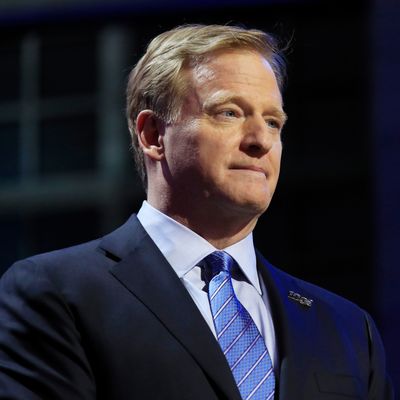
The NFL has long sold itself as the inflexible monolith of American sports, an impenetrable fortress that bends for no one. But you’ve seen how well supposed impenetrable fortresses have been holding up in 2020. The NFL, like the rest of us, is in the midst of a COVID-19 crisis. And — perhaps most mortifying to a league long accused of putting positive public relations above player safety and societal good — it’s playing out for the whole world to see.
This past weekend was a nightmare for the league. Instead of focusing on a riveting matchup between Tom Brady, the greatest quarterback of all time, and Patrick Mahomes, the reigning Super Bowl MVP (and Brady’s heir apparent), the NFL was watching:
- The San Francisco 49ers get booted not only from their stadium, but their practice facility for the next three weeks after Santa Clara County announced new COVID-19 restrictions banning all high school, college, and professional sports.
- The Baltimore Ravens suffer such a dramatic team-wide outbreak — they have had players and staff test positive for eight consecutive days — that their game against Pittsburgh was moved from Thanksgiving night all the way to this Tuesday, then postponed again to Wednesday.
- A Denver quarterback debacle. In the most embarrassing incident of the weekend, all four Broncos quarterbacks were forced to miss their game against the New Orleans Saints, because three of them spent hours indoors unmasked with the fourth, who tested positive. Thanks to their carelessness, a practice-squad wide receiver who hadn’t played QB since college had to step in. He threw nine passes, only one of which was caught by a teammate. (Two were caught by the Saints.)
The NFL shut down all team facilities on Monday and Tuesday, in hopes of slowing the spread of the virus after the Thanksgiving holiday, but they did play games all day Sunday (and played another one on Monday), so the whole thing felt like yet another Band-Aid for a league that’s bleeding everywhere. Some have argued that the league should shut down for a few weeks until we get through this current surge (if we get through this current surge) — or even push back the Super Bowl, currently scheduled for February 7 in Tampa. The NFL looks like yet another American institution brought down by its own hubris in the face of COVID-19, another cautionary tale of what happens when people refuse to take the coronavirus seriously.
It’s been a relief over the last week to have the comfortable, familiar sensation of making fun of Roger Goodell again. Didn’t you miss it? I sure did.
But remember: While the NFL holds the disadvantage of trying to finish its season in the middle of the worst COVID-19 surge yet, it also holds the advantage of being the sport that started its season last. And it has absorbed a few lessons that other leagues had to learn the hard way. The most important being: Don’t stop your season.
Actually, the most important lesson is “play in a bubble,” but going the way of the NBA was never a realistic notion for the NFL, with its army of personnel. So, in lieu of that, the NFL has taken a page from MLB and, especially, college sports (particularly those in the South) and decided that the only way to survive a pandemic is to plow right through it — and to stop for nothing.
Remember, Major League Baseball was potentially in worse danger just one week into its truncated season, plagued by outbreaks on both the Miami Marlins and the St. Louis Cardinals, to the point that commissioner Rob Manfred warned he’d have to cancel the season if teams couldn’t get the virus under control. But the league tightened its protocols and, in the face of near-universal derision, kept plunging forward toward one unquestioned goal: finishing the regular season and making it to the postseason, where the television money is most bountiful. Major League Baseball lost money this season — or at least it says it did — but it certainly lost less money than it might have, because it finished its season and completed the World Series on the same dates it always happens. (Though … barely.) That last part is important: The worst television ratings for sports this year have all been for sports that were taking place out of season. Fans are used to seeing the NBA Finals in June, not September, and the Masters in April, not November. The last thing the NFL wants is to move the Super Bowl off its signature Sunday on the American cultural calendar. This is particularly true for a league like the NFL, which is the financial driver of not just all sports but much of the television industry. Pausing weeks of the season or pushing back the Super Bowl would be a nightmare logistically and financially.
But the other lesson the NFL has learned from its fellow leagues is the one I wrote about last week: If none of your players get too sick, the public will not punish you for playing games. It might be embarrassing to see a Denver nobody throw the ball into the ground because he has no idea what he’s doing, but, you know, people were still betting on that game. To football fans, COVID has become just another line on the injury sheet. And if the fans don’t mind, and the players union (which shockingly negotiated a deal that allowed players to forgo pay for games that don’t take place) is too weak to mind, then management certainly isn’t going to mind. It is telling that the league seems less concerned with the the health risks to players and staff amid the pandemic than it is in figuring out how to keep the games going on as scheduled. The NFL, as we’ve seen from years of watching it wave away the connection between repeated concussions and CTE, may not always implement the best health practices. But the league remains sports’ preeminent logistics experts. If anyone can figure it out, they can.
Heck, they already are. On Monday, 49ers home games were swiftly shifted from Santa Clara to Glendale, Arizona, where the COVID regulations aren’t nearly as restrictive. This is following the lead of MLB again: The Toronto Blue Jays played their games in Buffalo because they couldn’t cross the border without quarantining for two weeks. (The NBA’s Toronto Raptors are doing the same, playing the coming, bubble-less season in Tampa. It’s an old carnival traveling sideshow trick: If the local authorities won’t let you throw axes at your assistant, find other local authorities who will. Player safety or community spread isn’t a consideration in any of this, of course. All that matters is finishing up the season. This is yet another by-product of the Trump administration’s feckless, I-take-no-responsibility approach to the pandemic: If they’re not watching out for us, the NFL sure isn’t going to.
And if you think the NFL is reckless, you should see what college basketball is doing. On Friday, No. 1-ranked Gonzaga had two people, a player and a staffer, test positive for COVID-19 the day after flying to a tournament with the rest of the team — and it went ahead and played its game anyway. Most remarkable was the reaction of the opposing coach, Auburn’s Bruce Pearl, who agreed to play and shrugged afterward, “You just do the best you can, and I’m glad we worked together and got the game in, and I hope nobody gets infected by it.” Yep, fingers crossed! In the wake of such flippant pandemic behavior, the NFL seems downright humanitarian.
Not that it really matters to the NFL, which has learned from all its PR crises of the past that as long as you play the games and provide television inventory, all will be forgiven — or at least forgotten. With the news of multiple vaccines on the way, and some experts estimating that we’ll all be vaccinated by next summer, the NFL only has to get through this season before returning to some semblance of normal by next fall. It will do whatever is required to get there, even if it means playing games on Wednesdays, starting random schmucks at quarterback, or turning Arizona into San Francisco East for a few weeks. The NFL is too big to stop. No matter what or who gets rolled over along the way.






























